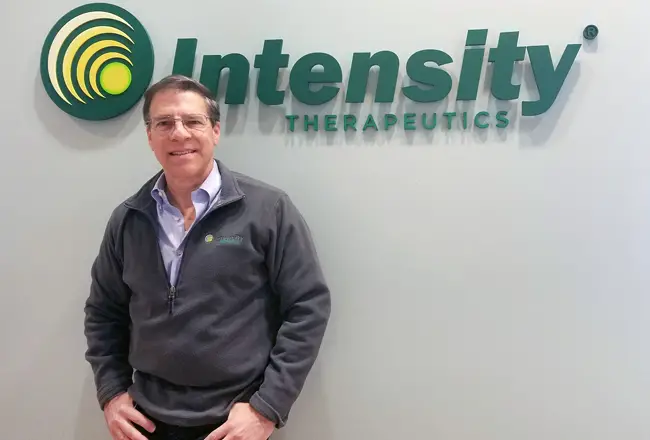Westport’s Intensity Therapeutics optimistic about potential cancer treatment

Armed with a pair of U.S. patents and some $13 million in investments, Intensity Therapeutics Inc. in Westport has started clinical trials on what its founder maintains could be a game-changer in the treatment of cancer.
“I looked at the problem from an engineer”™s perspective,” said Lew Bender, Intensity Therapeutics president and CEO, at his biotech company”™s 61 Wilton Road headquarters. “And what I wanted to do had three restrictions: killing big tumors without invasive surgery, getting rid of the small cancer cells that can”™t be seen by the naked eye, and cutting back on the toxicity” associated with chemotherapy and similar treatments.
The key, Bender said, was developing an immuno-oncology approach, an area of research that enlists and engineers the body’s own immune system to fight cancer. Bender and his team have developed a proprietary blend of cancer drugs that are soluble in both fat and water; this way, the Intensity treatment differs from chemotherapy, which can destroy tumors but can also have severe side effects, he said.
A water-soluble approach can increase drug circulation time, improve drug solubility, prolong the time a drug resides in a tumor and reduce toxicity. Instead of blasting a body with chemotherapy, the Intensity approach targets the tumor and cancer cells themselves and, through repeated treatment, can in effect “teach” the body”™s immune system to tell the difference between cancerous and non-cancerous cells and act accordingly.
The targeted treatment is designed to work on breast, colon, pancreatic, liver, lung and other cancers that do not respond to conventional treatments. Administered within tumors, Intensity”™s INT230-6 combines two chemotherapy medications. The only known side effect is some irritation at the injection site.
The potential end result, Bender said, is that once treatment is completed, the patient will be free of that cancer for the remainder of his or her life, as the immune system will now be “on alert” to combat any recurrence.
Bender cautioned that while experiments with mice have been successful, clinical trials with humans have just begun at the University of Southern California, Johns Hopkins in Baltimore, the Fox Chase Cancer Center in Philadelphia and the Princess Margaret Cancer Center in Toronto.
The trial process is a necessarily laborious one, Bender said. “You have to start out with a low dose with people for safety”™s sake. And once we have the data, which needs to show that it”™s safe and effective in numbers that are statistically significant, we go to the FDA (Food and Drug Administration). And that can take a number of years as well” for marketing approval.
So too with the patent process. “It”™s very expensive and can involve a very long period of time,” Bender said.
Intensity Therapeutics was awarded a U.S. patent in 2016 to protect its lead product, INT230-6, and in June received a second patent that broadens existing claims for its proprietary technology. Australia also recently granted Intensity a patent for its technology, Bender said.
Formerly the CEO of Interleukin Genetics in Waltham, Massachusetts, and chief technology officer at Emisphere Technologies, a pharmaceutical company in Roseland, New Jersey, Bender said he started his career as “an impatient young man. By 2012 I was no longer young, but I was still impatient.”
His impatience arose from “seeing friends of mine dying from cancer.” Bender said he resigned from Interleukin “because I didn”™t think our methods were working quickly enough” ”” the company in July announced plans to liquidate its assets. At a cocktail party, he began talking about the nascent research he was conducting on his way to developing INT230-6, and several friends offered to invest on the spot, Bender said.
That allowed him to continue experimenting on mice in area laboratories, which in turn led to “a couple of billionaire investors and, through networking, to where we are now, at over $13 million so far.” Investors include VCapital, British billionaire Jim Mellon and British company SalvaRx Group PLC.
Today the company has four full-time employees, including Ian B. Walters, its vice president and chief medical officer, a former Rockefeller University immunology researcher and former executive at Bristol-Myers Squibb. Intensity”™s board includes a former vice president of development for Pfizer and researchers from the National Cancer Institute, Smilow Cancer Hospital Yale-New Haven, the Swiss Institute for Experimental Cancer Research and the Sylvester Comprehensive Cancer Center at the University of Miami.
“There is no revenue stream,” Bender said. “We”™re living off of our investors. A new biotech has no revenue for several years until it gets a product approved, so it can be a very risky business.”
Bender underscored that it”™s been over five years since he started Intensity “and we”™re still years away from getting product approval.”
Should INT230-6 prove as effective as he believes it will, Bender said he expected large pharma companies to come calling with acquisition offers.
“We”™re still in the early stages,” he said. “But so far things are looking good.”